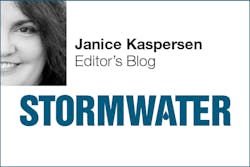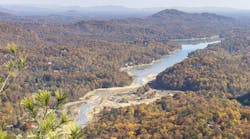
If you’ve been thinking about submitting an idea for a presentation at StormCon, this is an excellent time to do it. The StormCon call for speakers ends on Wednesday, December 5.
StormCon, now in its 18th year, is dedicated exclusively to stormwater and surface-water professionals: municipal stormwater and public works managers, industrial stormwater managers, engineering consultants, regulatory personnel, and watershed management professionals. It will take place in Atlanta, GA, on August 18–20, 2019. We are looking for presentations in six tracks, described in more detail below:
- Stormwater Infrastructure and Best Management Practices
- Green Infrastructure
- Stormwater Permit Compliance
- Funding, Staffing, and Managing the Stormwater Program
- Industrial Stormwater Management
- Research and Testing
This year, for the first time, presentations will be 40 minutes long. You can see the full Call for Speakers here and can submit your abstract online here.
Stormwater Infrastructure and Best Management Practices
This track presents examples of how structural and nonstructural best management practices (BMPs) are being used—with case studies and performance data—including combinations of BMPs to achieve water-quality goals. It also deals with “gray” stormwater infrastructure and conveyance systems: inlets, pipes, tunnels, and other detention facilities. Please note that there is a separate conference track specifically dealing with green infrastructure practices and installations.
Presentations must not promote or endorse any proprietary BMP, technology, or company, nor should they simply describe the features of a product; however, examples of infrastructure or BMP installations with data on the effectiveness of a particular system will be considered. Topics in this track include:
- Sizing and designing detention and conveyance systems
- Inspection, maintenance, and repair of BMPs
- Urban retrofitting
- Pipe rehabilitation and repair
- Filtration systems
- Retention and detention systems
- Advanced applications and treatment trains
- Post-construction stormwater management
Green Infrastructure
This track includes examples of green infrastructure and low impact development (LID). These practices strive to maintain or mimic the predevelopment hydrology of a site by infiltrating, storing, filtering, and evaporating stormwater runoff rather than moving it offsite to a centralized stormwater system. Areas of focus for this track include:
- Infiltration and bioretention practices
- Rain gardens
- Green roofs
- Porous pavement
- Maintenance of green infrastructure practices
- Measuring the effectiveness of green infrastructure
- Community-wide and watershed-scaled water-quality approaches
- Green infrastructure for infill development and redevelopment
- Green infrastructure to reduce combined sewer overflows
- Rainwater harvesting and stormwater reuse
- LEED-certified projects
Stormwater Permit Compliance
This track covers the different aspects of complying with municipal stormwater permits. Focus areas include:
- Strategies for meeting NPDES permit requirements
- Integrating the municipal stormwater program with TMDL development
- Building public education and outreach programs
- Illicit discharge detection and elimination programs
- Construction-site compliance
- Municipal good housekeeping practices
- Reporting requirements
- Program audits
Funding, Staffing, and Managing the Stormwater Program
This track covers funding and staffing issues affecting municipal and state programs:
- Funding options for stormwater programs, such as bonds, development impact fees, and enterprise funds
- Creating and managing a stormwater utility
- Obtaining Clean Water State Revolving Fund assistance
- Paying for capital improvement programs
- Stormwater credit trading
- Public-private partnerships
- Working with NGOs and other stakeholders
- Asset management
- Hiring and training in-house staff
- Hiring and working with consultants
Industrial Stormwater Management
This track covers industrial stormwater management and permitting, focusing on publicly and privately owned facilities covered by industrial stormwater permits or EPA’s stormwater multi-sector general permit. Such facilities range from small businesses located in urban areas, such as restaurants and automotive repair shops, to large sites such as manufacturing plants, transportation facilities, landfills and waste transfer stations, and mining operations. Topics in this track include:
- Managing stormwater at industrial and manufacturing facilities
- Stormwater management in the mining industry
- Concerns for oil and gas facilities
- Transportation activities: airports, ports, and fleet maintenance facilities
- Managing stormwater on active landfill sites
- Selection, installation, and maintenance of stormwater management systems on closed landfill sites
- Storage and handling of hazardous waste
- Inspecting industrial sites for stormwater compliance
- Integrating industrial stormwater operations with municipal permits
Research and Testing
This technical track includes academic research; methods for testing the effectiveness of best management practices and comparing different BMPs; and topics and trends in stormwater research, such as standardizing testing protocols and standards for measuring the effectiveness of BMPs. Topics in this track include:
- Performance standards and testing protocols
- Evaluating BMP performance
- Characterizing pollutant loads
- Fate and transport of pollutants
- Water-quality modeling
- Sampling tools and techniques
- Bacterial detection and identification techniques
Please note that we are not looking for descriptions of technologies or proprietary BMPs and how they work without supporting performance data. If your presentation deals with one or more BMPs, especially with proprietary systems, your abstract must indicate what supporting data the presentation will include.
About the Author
Janice Kaspersen
Janice Kaspersen is the former editor of Erosion Control and Stormwater magazines.

